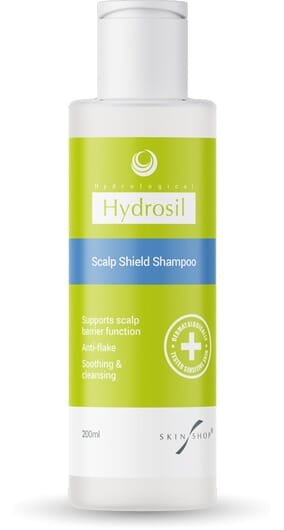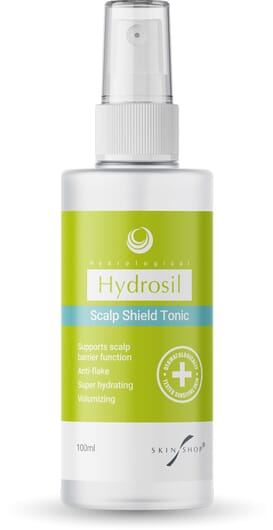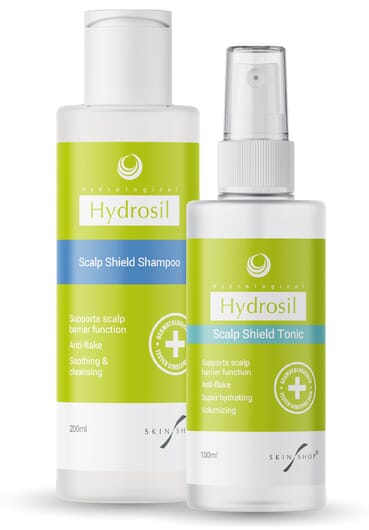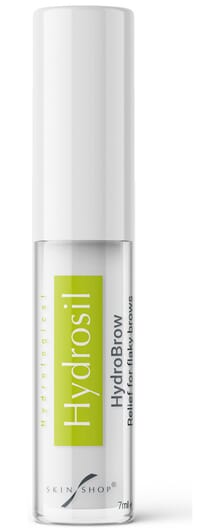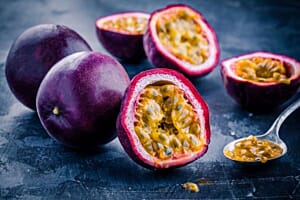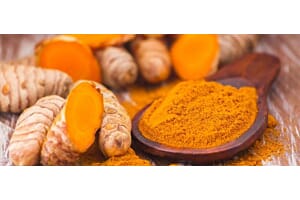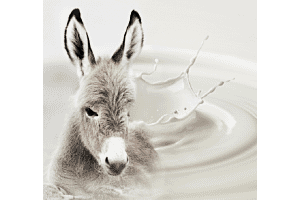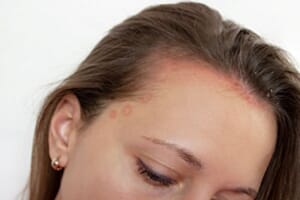After a lovely summer holiday, you may find that although you return with a glowing tan and a feeling of relaxed wellbeing, your scalp on the other hand may not be in quite such good condition.
Flaking dry scalp after summer holidays is very common and can last for weeks after you get home causing irritation and itching accompanied by acute dry flaking which can be very visible on clothes.

Many people make the mistake of thinking that their post-holiday dry scalp flaking is dandruff.
Normal dandruff is caused by fungal overgrowth on the scalp and is not the same as dry scalp dandruff and treatments for the two are very different.
If you often suffer from dandruff as other times of the year than perhaps your post summer holiday flaking is also normal fungal dandruff. Normal dandruff is also not typically accompanied by a very itchy scalp.
However, if you don’t usually suffer from dandruff but are experiencing a dry itchy scalp with lots of fine dry white flakes in the weeks after you return from summer holiday, it’s much more likely that you are suffering from dry scalp.
People can suffer from both norma fungal dandruff and dry scalp dandruff, so it’s important to distinguish between the two.
Crucially if you use normal anti dandruff shampoos on dry scalp you can end up making the condition even worse.
Dermatologist Dr Eva Melegh gives her top five tips on how to prevent and treat post-summer holiday dry scalp.
1. Hold On Hotel Hair Products
Most hotel shampoos are heavily scented and contain harsh preservatives and foaming agents which are used in very cheap shampoo formulations to make them last longer and cost less to make.

Switching for hotel shampoos from our normal hair care products can quickly lead to scalp contact dermatitis and end in dry scalp and scalp irritation. Contact dermatitis of the scalp from hotel hair products can cause extreme itching.
2. Avoid Anti-Dandruff Shampoos
Normal dandruff is caused by a fungus called Pityrosporum ovale that grows on the scalp. Anti-dandruff shampoos and treatments contain harsh antifungal agents to kill the fungus on the scalp.

However approximately 40% of dandruff is actually caused by dry scalp flaking due to scalp dermatitis and in post-summer holiday scalp issues its likely to be much higher.
3. Ditch the Daily Blow Dries
Your scalp is likely to be much drier than normal when you return from holiday due to increased sun exposure and maybe even some scalp sunburn, dehydration from increased sweating in hotter climates reduced humidity from hotter climates and dryness caused by chlorine in pools and sea salt on the scalp.

Blow drying hair dries out the scalp at the best of times to during the post-holiday period it’s a good idea to dry and reduce the amount of blow drying you do to the bare minimum.
For 2-3 weeks after returning from holiday try and let hair dry naturally and only use the hairdryer once the hair is almost dry and use it on a lower heat than normal.
Daily blow drying of hair is a main culprit for causing scalp dryness and flaking. If you have a dry, itchy or flaky scalp, try to let hair dry as much as possible naturally before blow drying. Using a lower heat when blow drying and applying a conditioner such as the Oregon anti-plaque conditioner by the Skin Shop will help prevent any dryness.
4. Diet Dynamics
It’s not unusual for our diets to change quite dramatically when we got on holiday.
The scalp is very sensitive to changes in diet so your scalp will probably be the first place that suffers.

It’s hard to control diet changes when you go on holiday as often you are eating foreign food and eating out in restaurants more so there will have already been one big diet shift during your holiday.
However, it’s easier to control what you are eating mor when you get home as often you are preparing your own food so on returning from holiday be aware of sudden diet changes. If you were eating more or less of something while on holiday, if possible, try to keep up that eating pattern and then slowing adapt back to your normal diet at home rather than immediately switching diet.
5. Replenish Scalp Barrier Function
Post-holiday dry scalp can be triggered by a reduced scalp barrier function caused by contact dermatitis from external environmental irritants or chemicals in hotel hair care products as well as sunburn. Back to work stress can also add to a reduced scalp barrier function, especially if you already have an underlying dry skin condition such as eczema.
Hydrosil Scalp Shield Tonic is a natural scalp tonic for dry and sensitive scalps containing proven ingredients to help support and improve scalp barrier function as well as reduce itching and irritation.

It contains a patented polyfructose extract from chicory root (Cichorium Intybus) which is a plant-based prebiotic complex that is proven to repair and strengthens scalp barrier function by encouraging the growth of beneficial scalp microbiota while inhibiting the growth of none-beneficial microbiota.




